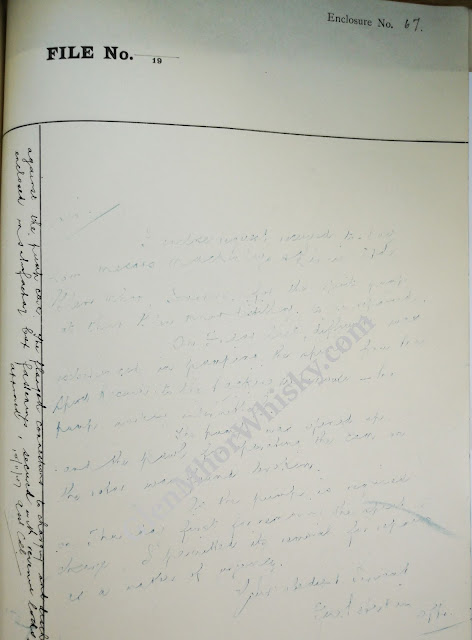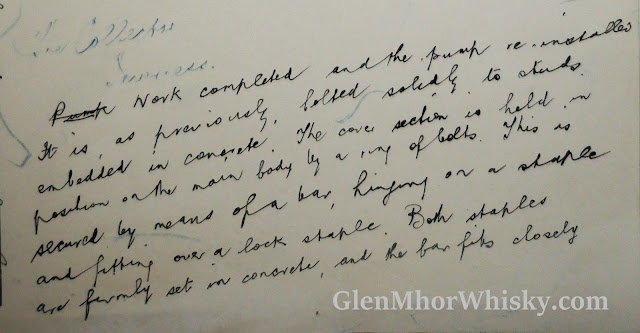Glen Mhor Log Book 10th November 1947
It's worth highlighting that this entry is undated by Gilbert W. Peterkin, which is unusual. However, we do have a date mentioned by the Collector when authorising the request, hence the date appearing in the title of this article.
I'd envisage that the actual request and entry was documented 1-2 Thursday's prior, given our past experiences of the way Customs & Excise worked, their turnarounds and what the entry contains. Gilbert's writing is extremely faint, but we do enjoy a challenge when transcribing these entries, so here we go...
'Sirs,
I enclose request received today from Messrs Mackinlay & Birnie Ltd. Glen Mhor, Inverness, for the spirit pump? at their Glen Mhor distillery to be repaired.
On Friday last, difficulty was experienced? in pumping the spirits from the Spirit Receiver to the racking warehouse - the pump working intermittently.
The pump was opened up, and the pump for operating the cam on the motor was found broken.
As the pump is required on Thursday first for removing the spirit charge, I permitted its removal for repairs as a matter of urgency.
Your obedient servant,
G.W. Peterkin, officer
The Collector, Inverness
(the handwriting at the bottom in clearer black ink, looks to be Peterkin with an update on the urgent repair)
Work completed and the pump reinstalled. It is, as previously bolted solidly to studs embedded in concrete. The core section is held in position on the main body by a ring of bolts. This is secured by means of a bar, hanging on a staple and fitting over a lock staple. Both staples are firmly set in concrete, and the bar fits closely
(margin entry, effectively continuing on from the above)
against the pump cover. The flanged connections to charging and discharge pipes are, as formerly enclosed in satisfactory box fastenings, secured with revenue locks.
Approved 10/11/47 Assistant Collector.'
To add further insight into this entry, beyond my mere rumblings of vacant theories, I asked Alan Winchester for his thoughts and I'm thankful for his continued input:
'Yes, as you can see quite tight security around a spirit pump, with at least a couple of Customs locks. The spirit in the stillhouse is collected in an Intermediate Spirit Receiver (ISR) the spirit pump transfers it to the Spirit Receiver / Warehouse Vat, where the Excise and the Trader would take account of the Spirit and reduce to filling strength. The Spirit Vat charge valve would be locked while the filling takes place. The Intermediate Spirit Receiver allows distillation to carry on while the casks are being filled.
I presume the pump would be from a central shaft, from turbine, but we must be close to the advent of the pumps being driven directly from an electric motor.
It’s interesting all this security around the pump, but any lack of secure plant, often was considered fair game for some staff, but the security was really to stop the company from removal of spirit that’s not accounted for.'
During our journey through this logbook, we've yet to find any reports of pilfering by the distillery staff. Although I do have a mention of this in its final years. Either the staff were extremely adept at hiding their method and tracks, or as Neil M. Gunn stated, they were fearful of John Birnie, who although recently departed prior to this entry, would have ensued a legacy of respecting rules and high standards.
An interesting entry, what it underlines is Gilbert's experience and allowing an urgent repair without too much bureaucracy hampering the effort. We know here that Glen Mhor would have malted, mashed and distilled earlier in the week - likely in a set pattern that's been in place for decades - although a recent prior entry highlighted some deviations around practices due to the impact of the war.
The pump fault would have been identified on a Thursday and without a speedy repair, things would have become backed up, or a more inefficient method to filling casks adopted. Thankfully, that seems not to be been required thanks to the team effort to locate the issue and make good the repair. A fine example of Customs & Excise working with the distillery team and owners to maintain production.
This Log Book comes from the Highland Archives Centre (HCA/D31/4/1/25) and is watermarked for its protection. As with any images on this website, please ask first before using and always give credit.


Comments
Post a Comment